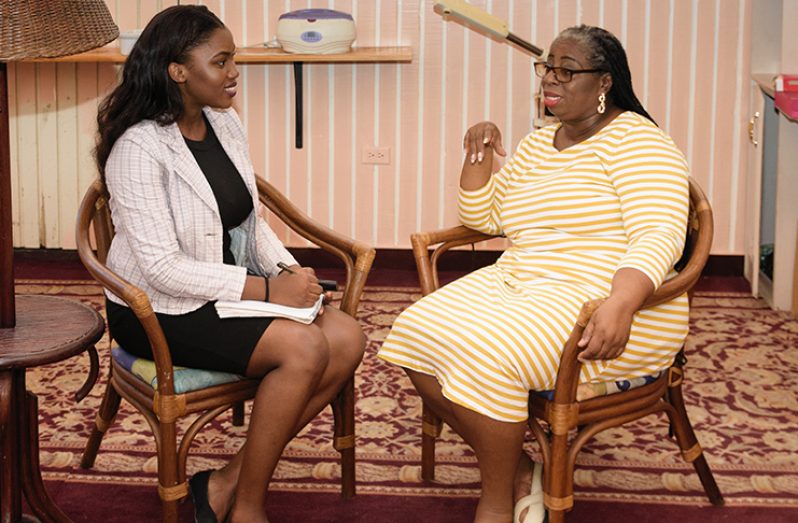By Gabriella Chapman
OVER the years we have seen the emergence of countless pageants in Guyana. Persons have even started to label our country, “Guyana, the land of many pageants.” A lot of businesses from the private and public sectors have opted out of supporting our queens and a lot of natives have lost respect for what can be a major contributing factor to the development of young women in society.
There has been a history of scandals in the industry that have tarnished the reputation of pageants in Guyana, the latest being Guyana’s ban from competing in the Miss Universe pageant for the next three years following a controversy with the local pageant’s franchise holder.
It leaves us to question what has become of the pageant industry in Guyana. How can we revamp this empowerment platform for young women?
For the next three weeks, the Pepperpot Magazine will feature the thoughts of Pamela Dillon, a local pageant mother who has been in the industry for decades, as she addresses the concerns or preconceived notions persons may have about pageantry in our country. We will be highlighting some of the challenges that may have contributed to the deterioration of and possible solutions to revitalise the industry.
She shared that Guyana has had great representation, dating back to the years of Shakira Baksh-Caine, 1967, Miss Guyana who went on to compete at the Miss World contest in London and finished in third place.
But “there was a lull,” she said, explaining that several “pageant politics” came into existence, ranging from racial prejudice to persons who are pageant fanatics, thinking that they can just “buy a franchise and call themselves franchise directors.”
PAGEANTRY AS A BUSINESS

It is lodged in the minds of many that pageantry in Guyana is done for a business; a means for the directors to make money. This notion was birthed from the social media hot topics of delegates not receiving prizes promised and delegates paying registration fees and not getting what was assured for the payment.
Dillon admitted that, indeed, pageantry is a business but it’s a business that is beneficial to young women. “Of course it is a business. It has to be a business because money is involved. Franchises are always for sale. So when you have invested in getting a franchise, it is only natural that you would want to make back your investment. You would want to ensure that you are equipped with funds to execute a proper production. But that’s the least of it all. It is a business, but its true benefit is how it transforms the lives of persons involved,” shared ‘Miss Pam’, as she is popularly known.
She further injected that sometimes their investments go downhill, referring to that of investing in a pageant franchise. And just like any other business, sometimes things don’t work out as planned, and subsequently, there is a failure to reach expectations, failure to hold up ends of bargains and failure to execute plans. She said this is by no means the interest of any franchise holder.
“It is within our best interest to deliver to expectations; to see changes and transformations in the lives of young girls and women. And pageantry is a lot of hard work for girls involved and we would want to reward them accordingly, but of recent, the support of the sectors that provide the financial support has declined. And because of that, it is sometimes hard for us to hold up our promises to the delegates because the support wasn’t as expected,” she said.
Despite the aforementioned, Miss Pam said she believes that the true reward of participating in a pageant should be what it does for the young women’s personal growth, confidence and self-image.
RACIAL PREJUDICE IN PAGEANTS
The pageant expert shared that racism has been prevalent in pageantry for a very long time, with the preference being the lighter toned delegate(s).
“I remember when I first came back to Guyana. There was a pageant, which was in the 80s, and I had just started my salon business and of course, the pageant girls always wanted their nails or makeup done and they all found their way to my salon, so I always was fortunate in hearing the off the record conversations amongst the delegates. And for a long time, we have been conscious of colour and we still are very conscious and that is a major part of the controversy in pageants…” Miss Pam said. “There was a pageant where one girl was ebony black. [She was] very beautiful, she lit up a room. Then there was another girl who came from Canada, she was Portuguese-mixed. And the race was on between the two beverage companies and the two girls since they were the two sponsors. It got really lawless and I think as a result it caused two major beverage companies who can make a difference in pageants in this country to have, since then, never done pageants. Two girls competing and it got very political. There was a lot of picketing and confusion. I think that is where some of the franchise holders came under fire,” Miss Dillon shared.
She added that she can recall a past franchise holder speaking publicly against his queen because he didn’t want her to win and he even stated that the judges were contaminated to arrive at the decision of the queen. Dillon further pointed out that it is indeed true and sad that sometimes Afro-Guyanese girls participating in pageants, especially the pageants with international legs, aren’t seen as the most suitable representative because of their colour. It is believed that to make it on the international stage, queens have to be of a lighter tone to make the final cut. She noted, however, that this phenomenon is slowly changing and she believes that all women are beautiful despite their differences and that should be the true meaning of pageantry.
“But we ourselves are the ones contributing to the discrimination. Sometimes it isn’t the directors of the pageant, it’s the public. Our very own Guyanese patrons. As soon as a line up is released to the public, they are the subject to a lot of criticism from their fellow Guyanese. They pull them apart and they add to the hate,” she said. “But it is time that we be patriotic and support our difference in culture, our difference in mixture, our difference in women, and realise that we have the power to transform them into the queen they need to be for our country.”
Look out for part two next week, where we will focus on the issue of “rigged pageants” and the fact that anyone now qualifies to own a franchise.



.jpg)











